Japan-Ukraine Relations
Prime Minister Shinzo Abe Visits Ukraine
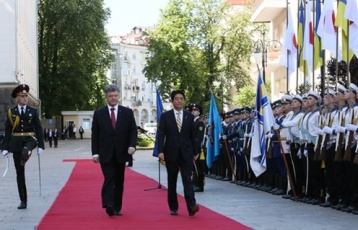 (Photo: Cabinet Public Relations Office)
(Photo: Cabinet Public Relations Office)
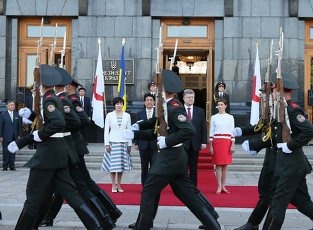 (Photo: Cabinet Public Relations Office)
(Photo: Cabinet Public Relations Office)
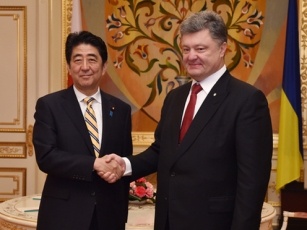 (Photo: Cabinet Public Relations Office)
(Photo: Cabinet Public Relations Office)
1. Japan-Ukraine Summit Meeting
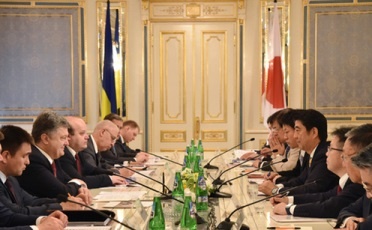 (Photo: Cabinet Public Relations Office)
(Photo: Cabinet Public Relations Office)
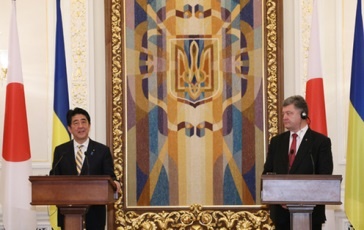 (Photo: Cabinet Public Relations Office)
(Photo: Cabinet Public Relations Office)
On June 6 (Sat.), for approximately 90 minutes from 10:15 a.m. to 11:50 a.m. (a small group meeting was held for the first 35 minutes), Prime Minister Abe held a meeting with Mr. Petro Poroshenko, President of Ukraine, at the Office of the President of Ukraine. An overview of the meeting is as follows: (From the Ukrainian side, Mr. Pavlo Klimkin, Minister for Foreign Affairs of Ukraine, and others attended the meeting. From the Japanese side, Mr. Hiroshige Seko, Deputy Chief Cabinet Secretary, and others attended the meeting.)
(1) Small group meeting
A. Opening of the meeting
- (a) President Poroshenko stated that he was deeply pleased by the first-ever visit to Ukraine by an incumbent Japanese Prime Minister since the independence of Ukraine and that it was meaningful that the two sides could hold a meeting prior to the G7 Summit. President Poroshenko also expressed his gratitude to Japan and the G7 for their strong stance towards the situation in Ukraine.
- (b) In response, Prime Minister Abe stated that he was pleased to become the first Japanese Prime Minister to visit Ukraine and expressed his gratitude for the warm greeting from the Ukrainian side. Prime Minister Abe added that he would like to further develop bilateral relations through the meeting.
B. Situation in Ukraine and Russia
- (a) President Poroshenko provided explanations on the current situation in Ukraine, the situation between Ukraine and Russia, the status of the implementation of the Minsk Agreements, and the current state of internal reforms.
- (b) In response, Prime Minister Abe stated that he would proactively discuss the situation in Ukraine at the G7 Summit 2015 in Schloss Elmau. Moreover, the Prime Minister added that as the next G7 chair country, Japan would play an even more proactive role towards achieving a diplomatic and peaceful solution of the situation in Ukraine.
- (c) In addition, Prime Minister Abe stated that the Government of Japan would not tolerate any attempts to change the status quo by force and that Japan had made consistent efforts to improve the situation, while respecting the sovereignty and territorial integrity of Ukraine. Prime Minister Abe then expressed his regret over the breach of the Minsk Agreements and pointed out the importance of the complete implementation of the Minsk Agreements by all the concerned parties.
C. Internal reforms in Ukraine and assistance from Japan
Prime Minister Abe pointed out that for Ukraine to become a resilient and sustainable country, bold and comprehensive reform would be essential, and pledged to continue to steadily provide wide-ranging support in fields such as the economy, finance, judicial matters, governance reform and energy, as long as Ukraine continued its reforms. In response to this, President Poroshenko expressed his strong intention to implement internal reforms and once again expressed his gratitude for the assistance from Japan.
(2) Plenary meeting
A. Opening
- (a) Touching upon the meeting with Prime Minister Abe in Milan last October, President Poroshenko stated that Ukraine and Japan shared many common values and interests. President Poroshenko also pointed out the fact that Odessa and Yokohama, as well as Kiev and Kyoto, were sister cities and stated that people to people exchanges were also important. Moreover, President Poroshenko stated that the Government of Ukraine supported the activities of the Japan Center in Ukraine and expressed his expectation for the further enhancement and promotion of bilateral relations.
- (b) In response, Prime Minister Abe stated that he was pleased to realize his visit to Ukraine, thereby fulfilling the promise he made in Milan.
B. Internal reforms in Ukraine and assistance from Japan
- (a) President Poroshenko stated that the financial assistance package from Japan was of great importance for Ukraine’s financial base, which formed the basis of the country’s reforms. He also expressed his hope that Japan would participate in the assistance for rebuilding Ukraine’s industrial infrastructure.
- (b) In response, Prime Minister Abe stated that in order to support Ukraine’s efforts for its reforms, Japan had already announced the provision of assistance totaling approximately USD 1.84 billion and expressed his expectation for the results that he hoped Ukraine would achieve. Moreover, Prime Minister Abe welcomed the signing of the Exchange of Notes for the large scale Bortnychi Sewage Treatment Plant Modernization Project, which would amount to JPY 110 billion. The Prime Minister also stated that in terms of the additional assistance of USD 300 million that Japan had expressed in coordination with the World Bank, the assistance would be provided following the effectuation of a bill concerning energy in Ukraine and therefore requested the efforts of the Ukrainian side for the early implementation of the bill.
- (c) Moreover, Prime Minister Abe conveyed Japan’s decision to dispatch personnel from Japan for the Special Monitoring Mission (SMM) of the Organization for Security and Co-operation in Europe (OSCE) and stated that the Government of Japan was looking into dispatching experts from fields such as the economy and finance including the banking sector and judicial matters.
C. Bilateral economic relations and Investment Agreement
- (a) President Poroshenko introduced a decision to ratify the Japan-Ukraine Investment Agreement in the Verkhovna Rada on June 3 and stated that he looked forward to welcoming the entry of many Japanese enterprises into Ukraine through the utilization of the Agreement.
- (b) In response, with regard to economic relations, Prime Minister Abe welcomed the signing of the Japan-Ukraine Investment Agreement in February. He expressed his pleasure at the decision by the Verkhovna Rada to ratify the Agreement and his hope that it would enter into effect at an early date. In addition, Prime Minister Abe expressed his high expectations for economic reform in Ukraine, a country that possesses tremendous potential. He stated that while monitoring the progress of reform, the Government of Japan would also support the further entry of Japanese enterprises into the Ukrainian market, including by dispatching an economic mission by the Japan External Trade Organization (JETRO), and requested the early preparation of the investment environment.
D. Cooperation in the field of energy
- (a) President Poroshenko stated that modernization and reform in the field of energy were extremely important, and expressed his intention to introduce effective and advanced energy technology and investment from Japan, particularly Japan’s high-quality coal fired power generation technology.
- (b) In response, Prime Minister Abe stated that Japan was currently formulating an energy policy master plan for Ukraine, which it planned to present this summer, and expressed his intention to cooperate with Ukraine regarding high-efficiency coal fired power plants. Prime Minister Abe also stated that the Government of Japan would consider the provision of a yen loan in the energy field.
E. Cooperation in other fields
- (a) President Poroshenko requested Japan’s cooperation for the holding of the Japan-Ukraine Joint Committee for the cooperation to advance aftermath response to accidents at nuclear power stations, support from Prime Minister Abe for Ukraine’s membership in the Asia-Europe Meeting (ASEM), and coordination with Japan for the improvement of agricultural facilities and introduction of technology. In response to the requests, Prime Minister Abe stated that the Government of Japan would make arrangements at the working-level for holding the third meeting of the committee, that Japan would support Ukraine’s membership in ASEM, and that Japan would consider any specific plans regarding cooperation for the improvement of Ukraine’s agricultural facilities.
- (b) Prime Minister Abe stated that a bipartisan parliamentary friendship association with Ukraine was reestablished in Japan and that the Government of Japan had decided to invite Mr. Volodymyr Hroysman, Chairperson of the Verkhovna Rada, to Japan. He also expressed his intention to activate exchanges between the parliamentarians of the two countries.
- (c) Moreover, Prime Minister Abe stated that in response to a request from the Ukrainian side, the Government of Japan would begin discussion toward visa exemptions for Ukraine’s diplomatic passport holders and added that he would further enhance dialogues in a wider range of fields in the future.
2. Other issues
 (Photo: Cabinet Public Relations Office)
(Photo: Cabinet Public Relations Office)
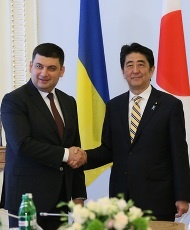 (Photo: Cabinet Public Relations Office)
(Photo: Cabinet Public Relations Office)
During his visit, Prime Minister Abe held meetings with Prime Minister Arseniy Yatsenyuk and Mr. Hroysman, Chairperson of the Verkhovna Rada; offered a floral tribute at the Tomb of the Unknown Soldier; made an offering at the Memorial in Commemoration of Famine’s Victims in Ukraine; paid a floral tribute to the cenotaph for the victims of “Maidan”; attended a military parade; and observed the hybrid vehicles used by traffic police.
 (Photo: Cabinet Public Relations Office)
(Photo: Cabinet Public Relations Office)
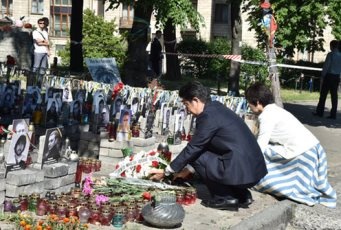 (Photo: Cabinet Public Relations Office)
(Photo: Cabinet Public Relations Office)
(Reference) Overview of the project for renovation of the Bortnychi Sewage Treatment Plant
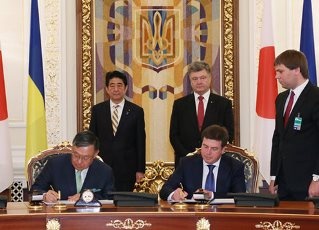 (Photo: Cabinet Public Relations Office)
(Photo: Cabinet Public Relations Office)
A yen loan project to Ukraine (a maximum of approximately JPY 108.1 billion). This project aims to renovate (new construction and renovation of the sewage-sludge treatment facility, introduction of a sludge incinerator, etc.) the Bortnychi Sewage Treatment Plant, which is located in Kiev, the capital city, and has deteriorated significantly, for the purpose of improving sewage disposal, thereby contributing to the improvement of the sanitary conditions and residential environment of the citizens of Kiev.

